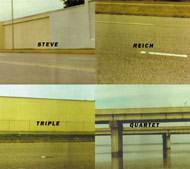How interesting is "minimalist" music? For
those that think of expression springing from gestures such as rubato,
dynamics or harmonic progressions, not very. But the sound-world of
a composer as good as Steve Reich is, I think, beautiful in itself,
and the expanded time-frames he generates with the constantly repeated
figures means the smallest gesture can become a dramatic event. Criticising
the form seems to me no more valid than criticising sonata form, because
the quality or lack thereof lies in the material. This CD brings together
a new work, a new recording of an old favourite and two transcriptions
of old ones. My judgement is that the material is excellent in one half
and duff in the other.
The new work presented here is the string Triple Quartet
Ė triple because there are parts for 3 string quartets. On this recording
the Kronos Quartet, the dedicatees, play the part for Quartet I alongside
a pre-recorded tape of themselves playing the parts for Quartets II
and III. Reich outlines a very definite harmonic structure in his sleeve
note, but for my taste it could have been more minimal. It is a very
expressionist piece, and to my ears tends to lurch between episodes,
rather than blend them in and out, like the best Reich does. There is
a definite (almost gypsy) quality to the sound however, and this piece
demands repeated listening. The performance by the Kronos Quartet is
committed and well-executed.
Electric Guitar Phase is a transcription of Violin
Phase, an absolutely seminal piece of Reich in which the variety is
achieved by the different tracks playing the same line at different
rates. This transcription brought an instantaneous adverse reaction
from me, using as it does the same weedy electric guitar sound of mid-80s
musos like Joe Satriani. Prejudiced, Iím sure, but I hated this version
and failed to see any addition to, let alone improvement on, the original.
Music For Large Ensemble is an absolute classic, capturing
Reichís technique at a sunny moment. Any new version has formidable
competition from Reichís own version on BIS. This version has a slightly
plummier sound (2 more violins have been added) than Reichís, which
has a crystal clear acoustic that makes it possible to hear everything
coming a mile away. This version is interesting and well-played in itself,
but I would still choose the composerís over it.
The pleasant surprise on this album is the Tokyo/Vermont
Counterpoint, another transcription, but this time a very worthwhile
one. Mika Yoshida has arranged the flute piece Vermont Counterpoint
for a MIDI Marimba, that creates a marimba sound, but curtails the sostenuto
of that instrument so as not to muddy the sound. The result is fantastic,
contemporary, intelligent and fascinating and would not sound out of
place on the soundtrack to American Beauty. A hit to finish a well-recorded
and well-presented album that is not essential Reich, but has plenty
to interest the enthusiast.
Aidan Twomey


